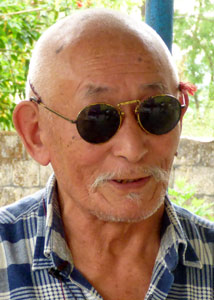Name: Lobsang Monlam
(Alias: No)
Gender: Male
Interview Age: 89
Date of Birth: 1926
Birthplace: Chungpa, Kham, Tibet
Year Left Tibet: 1959
Profession: Monk
Monk/Nun: Previously
Political Prisoner: No

Interview No.: 43N
Date: 2015-04-15
Language: Tibetan
Location: Jampaling, Tanahun, Gandaki, Nepal
Categories: Resistance and Revolution
Keywords: Chinese army -- invasion by , Chushi Gangdrug guerrillas, Dalai Lama -- escape, guerrillas in Mustang, Kham
Summary:
Lobsang Monlam was born in Chungpa on the border of Kham and Utsang Provinces. His family owned a very large flock of animals and his uncle was the leader of over 9,000 residents. Lobsang Monlam became a monk at the age of 3 at the Chungkhorgon Monastery and remained a monk until age 35 when he joined the Chushi Gangdrug [Defend Tibet Volunteer Force].
Lobsang Monlam explains how many monks and traders chose to join the Chushi Gangdrug in order to protect their country, the Buddhist dharma and His Holiness the Daila Lama against the Chinese invasion. He describes in detail how the Chinese deceived the Tibetans by bribing the aristocratic leaders and taking away the Tibetan army's stored ammunition. Andrug Gonpo Tashi was able to form the resistance group by pretending to build a golden throne so the group could meet secretly and plan their defense.
Lobsang Monlam was assigned to a group of men who successfully escorted His Holiness the Dalai Lama into India while others remained to resist the Chinese army. He also played a role in helping thousands of people escape into India. After a short time in India Lobsang Monlam rejoined the Chushi Gangdrug in Mustang, Nepal where they spent around 15 years planning and preparing to fight against the Chinese.
Interview Team:
- Marcella Adamski (Interviewer)
- Palden Tsering (Interpreter)
- Dhiraj Kafle (Videographer)

